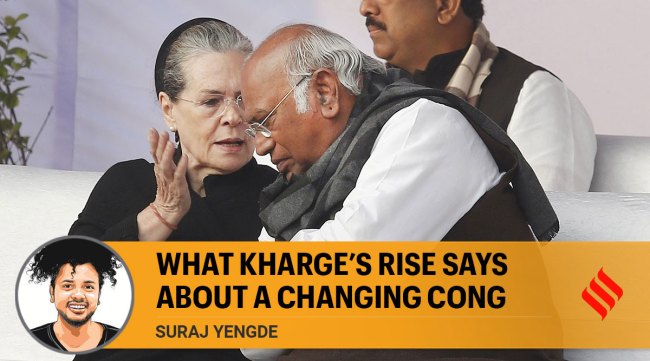Opinion What Kharge’s rise says about a changing Congress
At a time when politics produces a self-serving creed, Kharge’s long association with the Congress party amidst tumult and factionalism is a sight of extraordinary commitment to an ideology and its life.
 Congress president Mallikarjun Kharge and Sonia Gandhi during a tribute ceremoney for Dr. BR Ambedkar at the Parliament House in New Delhi. (Express Photo by Anil Sharma)
Congress president Mallikarjun Kharge and Sonia Gandhi during a tribute ceremoney for Dr. BR Ambedkar at the Parliament House in New Delhi. (Express Photo by Anil Sharma) One of India’s senior most leaders and an activist of post-Independence India, Mallikarjun Kharge, has emerged as the leader of the Indian National Congress. To fully fathom the import of Kharge in the Congress, we have to study what Congress meant to India. Originally formed as a communion of the late 19th-Century caste elites, over the years, the Congress has evolved to suit the needs of its people
Kharge is the most qualified politician to lead India’s oldest political organisation. The octogenarian leader has been a cardholder of the party since 1969. Having witnessed the evolving symbols of the Congress – from a bullock cart to a cow with a calf and now the right palm – Kharge has loyally carried that identity without flickering despite several winds of change.
At a time when politics produces a self-serving creed, Kharge’s long association with the party amidst tumult and factionalism is a sight of extraordinary commitment to an ideology and its life.
He certainly is one who belongs to the high culture of India’s original indigenous tribes that ruled, preserved, and conserved the land. They braved the invading forces from the Eurasian plateaus, the West Asian party of attackers, the Turks, and the Mongols.
Kharge is fully aware of this history. His election to the Congress party is in many homecomings of history, its bitter feuds, and contemporary complacency. Where the location of politics and harmony of society breaks, India’s feudal order rises to appropriate the democratic gains fought for by its subjects.
The tragedy of the Congress party is not unnatural. It is the rule of power to balance. To rise is to then fall. However, the structure of the force that grants power need not fall. The Constitution of India is that stronghold that has not yet fallen amidst the breaking forces of India breathing every day to challenge the difficult Republic. One wonders what would have happened should the cudgels of the Congress party have been handed over to Dr Ambedkar or Jagjivan Ram who led the frontiers of democracy amidst unfavourable pushbacks.
Given the chequered history of the Congress as a ruling party for most of India’s postcolonial history, its leaders will have to shoulder the burden of cleaning up. Kharge, who belongs to an earlier generation, has to fight the opposition that is convicted of establishing its singular hegemonic sensibility.
The hegemonic force has alternative plans. It invests in creating opposition. This opposition is then maligned, hated, and singularly targeted, making it appear that they are the arch enemies. The public is involved in collective thinking that there has been a rise of a hardcore opposition that the dispensation is paying its singular attention.
For the Congress party to be able to respond, it has to tune into the country’s pulse. This is what Rahul Gandhi is doing with his Bharat Jodo Yatra. Like a metaphor for the body, he is traversing through the nation’s veins, touching various points of contact by fusing with the public. If nothing concrete comes out of it, Rahul, at least, has to celebrate that he clocked those miles on his Fitbit.
Long marches have proved very influential in the politics of passive resistance. Kanshi Ram articulated the idea of a massive outreach via his cycle rally. He rode from Kanyakumari to Kashmir. This resulted in Kanshi Ram gaining nationwide attention and approval. This was evident in the BSP’s recognition as a national-level party led by the poor and landless subalterns. Similarly, Ambedkarite Jogendra Kawade firmly keeps issues of justice as the focus of his long marches. L K Advani’s rath yatra against OBC reservation paved the way for the BJP to come to power.
Given the evidence of how political marches have yielded results for those willing to walk their talk, one has to see the effects of Rahul Gandhi’s yatra on the BJP’s muscular assertion of caste politics. Meanwhile, in Telangana alone, BSP state president R S Praveen is nearing a 150-day spell, visiting over a thousand villages.
Suraj Yengde, author of bestseller Caste Matters, is a postdoctoral fellow at Harvard Kennedy School and a recipient of the ‘Rohith Vemula Memorial Scholar Award






